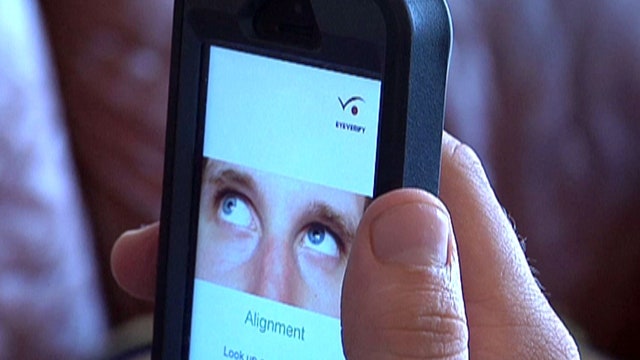Take a Peek: Biometric Security Offers Relief from Passwords
With biometric security like EyeVerify's Eyeprint scanner, you may never need to remember another password again.
EyeVerify is a start-up company in the Kansas City Startup Village, working on innovative biometric security for smartphones and tablets. The software scans the eyes of the user in place of a password, and if it's not the right person, the software won't open.
Biometric security means a physical characteristic is used to identify the right person. This could be something like a fingerprint, handprint, voice analysis, or eye scan.
"It actually is equal to a 50-character complicated password - which obviously no human would ever use or remember," said Chris Barnett, the EVP of Sales and Marketing for EyeVerify.
Barnett said many security issues come from people using simple passwords that are easy to guess, or forgetting longer passwords and constantly needing to reset.
EyeVerify hopes its software can fix some of what it calls "password pain."
The software uses the camera already in the smartphone to snap a picture. It looks for vein patterns in the whites of the eyes, which are unique just like fingerprints. Barnett said there is a two-in-one-hundred-thousand chance of someone being able to fake their way into the software.
People with bloodshot eyes can still use the software without problem.
"You can have allergies, you can have hay fever, you could be out late the night before, drinking the night before, you could live in California and use medicinal marijuana, all those things don't change the pattern of blood vessels, they simply make them bigger," said Toby Rush, the CEO of EyeVerify.
Although bloodshot eyes won't affect the software's ability to read eye vein patterns, physical damage, like a swollen shut eye, will.
The software stores the unique "Eyeprint" to the user's smartphone so not only do you need the right device, but also the right person to get access.
"We use the phone as a token and your biometrics as a second token and take passwords out of the picture all together," said Rush.
EyeVerify says it could make mobile banking more secure and protect companies with employees who use phones to access sensitive information.
Barnett said that more employees use their smartphones to access company information than ever before. That opens up security problems for companies and also can cause frustration in IT departments when employees continually lose or forget their passwords.
"With our technology, big companies can just eliminate all that password pain for themselves and their employees and be absolutely sure this really is an employee," said Barnett.
One of the first U.S. companies to feature EyeVerify software on their app is mobile security provider Good Technology. Employees in finance, healthcare, military and government groups use their technology to access email, calendars, project schedules and contact information.
EyeVerify said it hopes to sell its software to banks, which would use the eye scanner in their mobile apps. EyeVerify believes this would make mobile banking much more secure and ensure that the apps are not easy to break into if the phone is stolen.




















